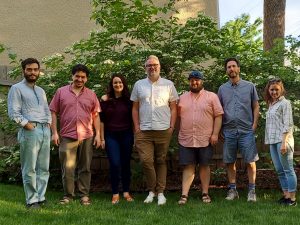This summer my tenure as director of CHGS comes to an end. Since the moment I arrived in Minneapolis from Germany in August 2012, I have marveled at the intellectual vigor, ingenuity, and enthusiasm for learning at the University of Minnesota. I feel honored and humbled to have worked alongside and with so many wonderful colleagues. What we have achieved here at the Center over the last decade in essence is due to the special bonds and partnerships forged between our inspiring faculty, tirelessly dedicated staff, and superb student scholars. Collaboration and timely exchanges at the local, national and international levels have also enabled us to develop an exceptional range of scholarly, teaching, and public engagement programs.
I truly take heart in the manner in which our team has upheld the Center’s strong tradition of outreach to educators and the public at large, affirming the legacy of the Center’s founding director Stephen Feinstein. To that end, it was imperative that we expanded the Center’s resources on the Holocaust and other genocides, including those that occurred on North American soil.
These past ten whirlwind years have been a time of intense learning for me. I have been touched by survivors and descendants who confided in me their stories of loss and pain, but also resilience and hope. I was privileged to learn from artists whose work illuminated the past in powerful new ways, and from teachers seasoned in engaging creatively, learners with the difficult truths of the histories and lasting legacies of mass violence. In my classes, I was heartened by students who shared their deep convictions in ending hatred and embracing humanity’s fullness.
At the Center our goal has been to construct a platform to support and promote this spirit, knowledge, and skills, facilitating bridges between scholars, students, educators, advocates, and interested audiences community-wide. Our conference this July, Education after Genocide: Shifting Approaches to Conflict, Prevention, and Redress, the culmination of a year of careful planning, stands in tribute to the CHGS approach and philosophy. After this conference, I am proud to hand the reins of our center to Assistant Director Joe Eggers who will serve for one year as the Interim Director of CHGS. I cannot think of a better fit for this transitional period than Joe, whose professionalism and commitment to the Center´s mission have proven pivotal for countless programs and initiatives. In addition to his many roles, Joe will coordinate the Center´s public programs with the counsel of the Advisory Board and continue providing opportunities for students, faculty, and educators.
I look forward to seeing the Center grow in scope and impact over the next years under new leadership. I am confident that many new opportunities and alliances await. For the upcoming academic year, I was awarded a fellowship to continue my current research in genocide memory studies at the Department of Social Anthropology and the Centro Internacional de Memoria y Derechos Humanos at UNED University in Madrid. Even though I will be based in Europe, I am only an email away and I look forward to advancing the cause of the Center in a different capacity. The relevance of Holocaust and genocide studies and education to the realities that are unfolding in the US and globally cannot be sufficiently stressed. In the hopeful words of Spanish Buchenwald survivor and acclaimed writer Jorge Semprún: The world doesn’t have to be unfair or unbearable…we can fix certain things. I still have those illusions, perhaps more than ever.
Please continue supporting the Center through your engagement, expertise, and material assistance.


Comments